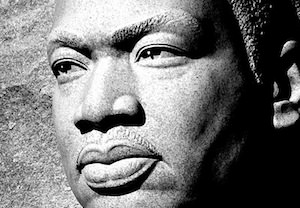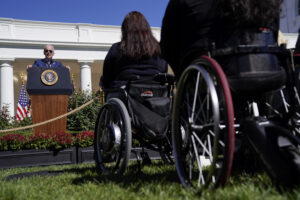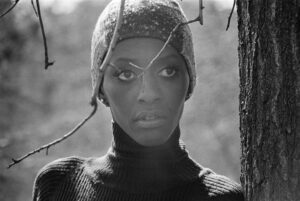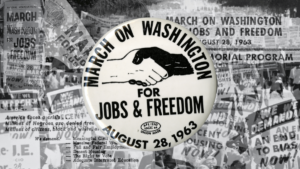Fifty Years After MLK’s ‘Dream,’ a Nation Still Divided
A new Pew Research Center study finds a significant gap between white and black Americans in perceptions of racial equality.
A new study out by the Pew Research Center finds that perceptions of racial equality in America are, well, a black-and-white issue.
The study, which comes a half century after the Rev. Martin Luther King’s “I Have a Dream” speech, found that whites have a much rosier view of the state of black America than do blacks. While only 44 percent of whites felt that “a lot more” needs to be done to achieve racial equality, an overwhelming majority of African-Americans — 79 percent — felt so. Even wider gaps came in perceptions of how black Americans are treated by police and courts. And more than a third of blacks said they had been discriminated against at least once in the previous year, compared with one in 10 whites who felt they had endured discrimination.
The good news: 73 percent of blacks and 81 percent of whites believe the races get along “very well” or “pretty well.” But a sense of progress that came with the election of Barack Obama as the nation’s first African-American president has faded.
“While demographic change happens slowly, attitudes can change quickly,” the report noted. “Since 2009, there has been a fading of the heightened sense of progress that blacks felt immediately after Obama’s election in 2008. Today, only about one-in-four African Americans (26 percent) say the situation of black people in this country is better now than it was five years ago, down sharply from the 39 percent who said the same in a 2009 Pew Research Center survey.”
Part of the split in broad perceptions of equality stems from a drop in historical and overt acts of violent racism, such as lynchings and cross burnings, Jerome Rabow, UCLA professor emeritus of sociology, told the Los Angeles Times. To whites, “the hideous things that have happened in our history … have tended to disappear,” Rabow says. “When blacks talk about how they’re doing, it’s more about their daily lives.”
And that includes lack of access to job opportunities, higher rates of interactions with police, and different treatment in social situations. The divide can be measured in numbers, with increases over the last 50 years in the gaps between median household income and median household wealth.
Much of the racial disparity has moved into the range of more subtle institutional and social structures, the Times reported:
Many experts argue that “structural racism” — advantages and disadvantages that perpetuate themselves even without people choosing to discriminate — plays a big part in continued inequality. For instance, even if companies don’t try to avoid hiring blacks, blacks may be less likely to get the best jobs because many get filled through word-of-mouth. That gives an edge to those who live and socialize with people already working lucrative jobs, who remain disproportionately white.
But whites have pulled away from such ideas: Over recent decades, fewer agreed on national surveys that slavery and discrimination had created conditions that made it hard for blacks to advance, University of Illinois at Chicago sociology professor Maria Krysan found. Instead, more chalk up inequalities to differences in culture, blaming those who aren’t succeeding, she said.
In a sense, whites are less aware of the reality, the experts argue. In fact, the Pew study found that more than half of whites believed blacks were doing as well or better than whites financially. But among blacks, nearly 60 percent felt they were worse off than whites, a belief supported by the financial data in the study.
The full study can be read here.
—Posted by Scott Martelle.
Your support matters…Independent journalism is under threat and overshadowed by heavily funded mainstream media.
You can help level the playing field. Become a member.
Your tax-deductible contribution keeps us digging beneath the headlines to give you thought-provoking, investigative reporting and analysis that unearths what's really happening- without compromise.
Give today to support our courageous, independent journalists.







You need to be a supporter to comment.
There are currently no responses to this article.
Be the first to respond.